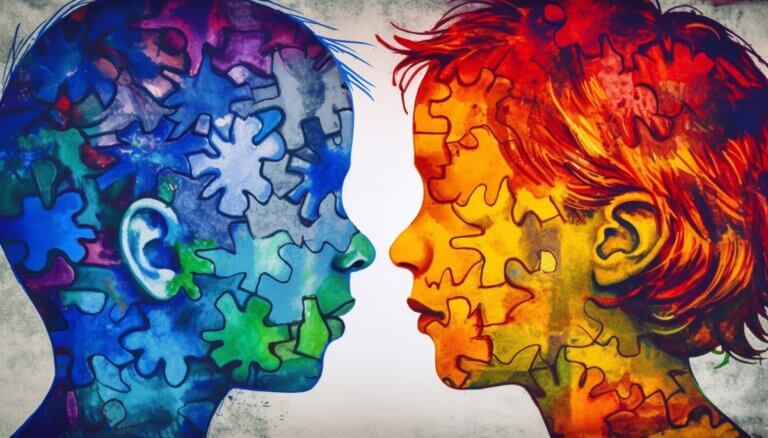Table of Contents
Emotional Intelligence in Everyday Leadership

Self-awareness and Self-regulation
A pronounced emotional intelligence is the foundation for balanced leadership and represents a central element on the path to a harmonious Work-Life-Balance. Leaders who are aware of their emotions and manage them effectively navigate through the turbulent waters of daily work life with impressive calmness and efficiency. This awareness – self-awareness – enables them to recognize and understand their own feelings, which is an essential prerequisite for emotional maturity.
A practical example can be found in dealing with conflicts within a company. A manager with high emotional intelligence will perceive their own emotional reactions to a heated discussion and can consciously decide how to respond. This does not mean suppressing emotions, but rather assessing the appropriateness and strategically controlling the reaction. In such moments, self-regulation comes into play – it enables strategic action rather than impulsive reactions.
Another scenario involves stress reduction. Balance in leadership also means recognizing and regulating one’s own stress levels. Through methods such as deliberate breaks, meditation, or physical exercise, emotionally intelligent leaders manage to maintain a state of Emotional Equilibrium and prevent burnout.
- Knowledge of one’s own strengths and weaknesses forms the basis for effective decision-making and leadership actions.
- Emotional self-control protects against hasty reactions and promotes well-considered responses.
- The ability to reflect on one’s own emotions makes it easier to create an environment in which Emotional Intelligence in Life Balance is fostered.
In an ever-changing work environment, it is precisely these skills of self-awareness and self-regulation that distinguish an inspiring and resilient leader. They demonstrate that a deep understanding of one’s own emotional processes is essential for a people-centered and thus successful leadership style in which employee motivation and creativity thrive while maintaining work-life balance.
Empathy and Relationship Management
Empathy and Relationship Building
Emotional intelligence in life balance is a crucial factor for successful leaders and teams. A core element of emotional intelligence is empathy – the ability to recognize, understand, and appropriately respond to the emotions of others. Empathy plays a central role in shaping relationships between leaders and employees and significantly contributes to work-life balance and a balanced, positive work environment.
- Empathetic leaders actively use listening to understand the concerns and desires of their employees. For instance, by perceiving emotional signals during staff conversations, they can provide targeted support and motivation.
- Balance in leadership is evident when leaders not only focus on performance but also consider the personal circumstances of their employees. An employee caring for a sick family member might need flexible working hours to balance work and family care.
- A balanced leadership approach is also revealed in how managers tailor their decisions to the emotional state of the team. Before announcing major changes, they evaluate potential worries and fears to alleviate these through transparent communication and empathy.
Empathetic balance is not only important in the direct work context. It also plays a pivotal role in team development and conflict management. When team members have differing opinions and work methods, the empathetic leader helps through mediation to identify commonalities and promote harmonious cooperation.
- When assembling project teams, empathetic leaders consider the individual strengths and weaknesses of team members to create a synergistic work atmosphere that supports work-life balance and prevents overburdening.
- In the event of a conflict, they utilize their ability to communicate empathetically to find solutions that are fair to all parties and maintain the emotional balance within the team.
Balanced Leadership ultimately means that leaders keep an eye on their own emotional state and set an example of emotional self-regulation. Through self-reflection and regular questioning of their own empathy skills, they can continuously develop and thus establish a climate of trust and openness.
Empathy in leadership practice is thus a dynamic process that not only contributes to better performance and satisfaction but also creates an environment where employees feel valued and can fully realize their potential.
Emotional Intelligence Strategies for a Healthy Work-Life Balance

Effective Communication and Conflict Resolution
Emotional intelligence in life balance is a key concept that enables leaders to develop effective communication styles and conflict resolution strategies. Achieving balanced emotional equilibrium allows leaders to create an environment where team spirit is enhanced and employee well-being is promoted, directly contributing to work-life balance.
The Role of Emotional Intelligence in Communication
Communication is the foundation of successful leadership. A leader who understands their own emotional landscape can adapt their words and communication style to not only inform the team but also inspire it. Take, for example, a leader who maintains calm in the face of tight project deadlines. By their ability to regulate feelings of stress, a serene environment is established that soothes employees and gives them the confidence to tackle challenges together.
- Attentive Listening: A crucial aspect of communication is to actively listen, respond empathetically, and create a foundation of trust within the team through this caring approach.
- Non-verbal Communication: Emotional intelligence also includes interpreting and consciously using body language and facial expressions to project confidence and openness.
- Feedback Culture: Balanced leadership fosters an environment where constructive feedback is given and received, leading to the continuous development and improvement of the team.
Strategies for Conflict Resolution
Conflicts are an inevitable reality. Emotional intelligence allows viewing these conflicts not as disturbances but as opportunities for development and strengthening of the team. Suppose two team members clash due to differing approaches. An emotionally intelligent leader would see this as an opportunity to mediate, identify common goals, and achieve a win-win situation through empathetic action.
Awareness of others’ emotions: This involves understanding the concerns and perspectives of all involved, and proposing solutions that align with the needs of both the team and the project.
Balanced Decision Making: A balance in leadership is demonstrated by considering both factual and emotional aspects in conflicts, while acting fairly and equitably.
Through emotional intelligence, the balance between work and personal life is not only facilitated but also solidified as an integral part of a healthy corporate culture. By focusing on emotional balance, leaders can create an environment where both the company’s goals and the individual needs of employees are considered. Applying these principles leads to improved work-life balance for the entire team and lays the foundation for sustained success and satisfaction at the workplace.
Motivation and Team Leadership
In our fast-paced world, work-life balance has become an especially essential asset. Emotional intelligence in life balance plays a pivotal role in how we meet the challenges of everyday professional life and help our teams do the same. Balanced leadership is based on the ability to understand and manage one’s own emotions and those of employees.
Emotional Intelligence as a Foundation of Self-Motivation
A key aspect of self-motivation is emotional balance. A leader who consciously regulates their own feelings can better handle stress and remains focused even in challenging times. This inner balance radiates and serves as a model for the team. Imagine a project manager who, despite tight deadlines, exudes calm and optimism. This attitude is contagious and creates an atmosphere in which team members can approach their tasks balanced and with positive energy.
- Consciously reflecting on failures as learning opportunities fosters resilience.
- Regular self-assessment helps in identifying emotional needs.
- Developing empathy enables the creation of individual incentives for each team member.
The Art of Motivation: Emotional Intelligence in Team Leadership
Balance in leadership means recognizing and promoting the individual motivation of team members. Emotional intelligence allows one to shape an environment where employees feel appreciated and understood, which in turn strengthens their intrinsic motivation. For example, a leader who actively listens and responds to the suggestions and concerns of team members promotes an inclusive environment where everyone feels involved. This can lead to increased satisfaction and productivity, without compromising work-life balance.
- Recognizing team achievements and individual contributions fosters a positive work climate.
- Constructive feedback and targeted support help employees develop their skills.
- Transparent communication about company goals conveys meaning and direction.
Emotional intelligence is the tool that enables leaders and teams to find a balance between high performance and a healthy work-life balance. By exemplifying emotionally intelligent behavior and promoting it within the team, an environment is created that is characterized by motivation, satisfaction, and success.
Summary
The Importance of Emotional Intelligence for Work-Life Balance
Emotional intelligence and work-life balance are crucial for modern leaders. The ability to recognize and control one’s own emotions greatly influences balanced leadership. It allows leaders to remain calm despite the demands of professional life, manage conflicts wisely, and lead their team effectively and empathetically.
- The awareness and regulation of one’s own emotions contribute to wise decisions and help avoid impulsive actions.
- The cultivation of emotional balance through methods such as meditation and deliberate breaks promotes well-being and prevents burnout.
- A deep understanding of one’s own emotional dynamics is essential to fostering motivation and creativity in the team without losing sight of work-life balance.
Empathy as a Key in Dealing with Employees
Emotional Intelligence in Life Balance enhances leadership skills through empathy and thus fosters a strong relationship with employees. Understanding and appropriately responding to others’ feelings creates a positive work environment that supports work-life balance.
- Empathetic leaders practice active listening to address individual concerns and create an atmosphere of respect and understanding.
- In team development and conflict management, emotional intelligence is essential for promoting harmony and developing solutions that consider the well-being of all.
Effective communication, guided by emotional intelligence, strengthens team spirit and ensures clear, inspiring messages. It also allows leaders to view conflicts not as disturbances, but as opportunities from which the team can emerge stronger.
Self-motivation and team motivation are interdependent: Leadership styles that exemplify emotional self-regulation inspire a positive attitude and thus promote team success and individual work-life balance. By practicing balance in leadership and placing emotional intelligence at the heart of their leadership methods, leaders become beacons for a balanced and effective work environment.
FAQ – Emotional Intelligence and Work-Life Balance
How can leaders use their emotional intelligence to help employees reduce stress and find a balance between work and personal life?
Leaders with high emotional intelligence can create an empathetic working environment by addressing the individual needs of their employees, thus fostering a culture of trust and support. They can use techniques of active listening and open communication to identify workplace stressors and collaborate with employees to develop strategies that facilitate a healthy work-life balance. Such leaders are also capable of implementing more flexible work models and providing employees with the necessary resources, thereby empowering them to work effectively and manage their time better.
How can leaders use their emotional intelligence to concretely support employees in achieving a healthy work-life balance?
Leaders can employ their emotional intelligence by addressing the individual needs of their employees and responding empathetically to signs of overwork or stress. Through active listening and promoting an open dialogue, they help create a work environment where work-life balance is taken seriously, and measures to make working hours more flexible or to provide daily support are collaboratively developed.
How can leaders use their emotional intelligence to help employees manage stress and achieve a healthy work-life balance?
Leaders can utilize their emotional intelligence to empathetically respond to the individual needs of their employees by actively listening and offering flexible support. By fostering a healthy work environment that emphasizes breaks, open communication, and mutual support, they assist their teams in managing stress and finding a balance between work and private life.




